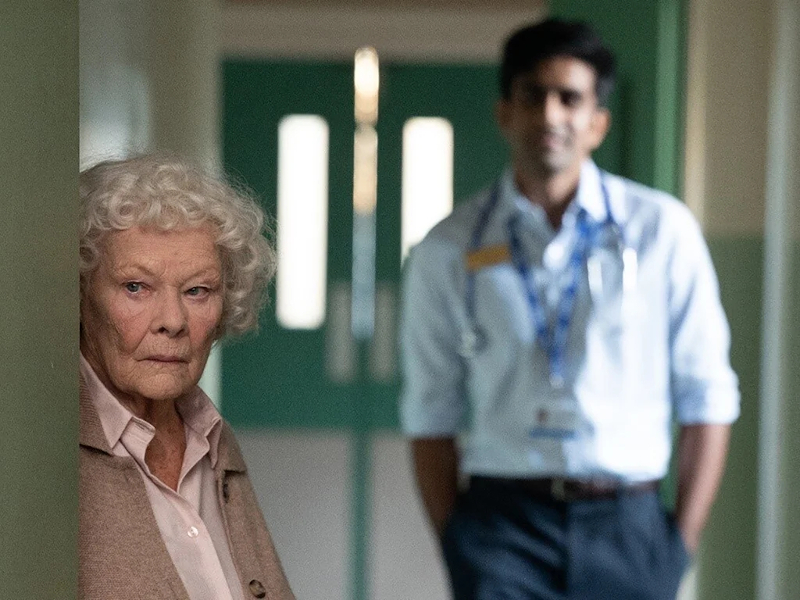Director – Richard Eyre – 2022 – UK – Cert. 12a – 98m
***
While a small NHS hospital in Wakefield, Yorkshire is in danger of being closed down by the government as inefficient, it seeks to care for its geriatric patients– out in UK cinemas on Friday, March 17th
Based on the 2018 stage play by Alan Bennett, this multiple plot- and character-drama follows the day-to-day lives of assorted, mostly terminal, geriatric patients in The Beth, or the Bethlehem Hospital to give it its full name, in Wakefield, Yorkshire. Dr. Valentine (Bally Gill) whose real Indian name no-one can pronounce (really?) provides a framing device, a man who in an engaging, opening voice-over makes it clear that he genuinely cares for the elderly and who closes the film in a couple of scenes that don’t really work. Of which, more later.
Because what follows is for the most part character- rather than plot-driven, the character of Dr. Valentine doing his rounds and grappling with the inevitable day-to-day crises as they come up provides the main structural spine of the story.
I say ‘the main’ line, but in fact there is one other character who serves a similar function not to mention several subsidiary plots, one of which is considerably weightier than the others.
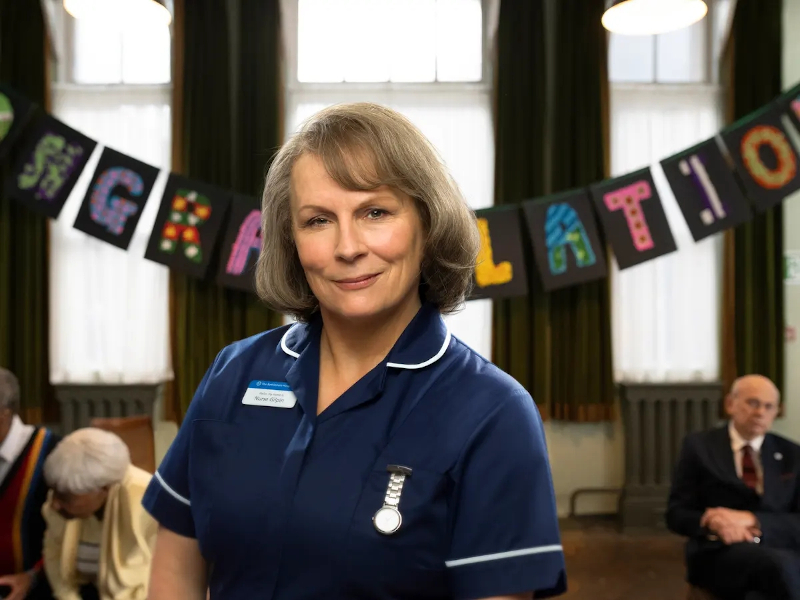
That other character is Sister Gilpin (a standout performance by Jennifer Saunders), the largely humourless, nursing professional who runs the ward as a tight regime, warning distraught patients that there is no such things as a one-off incident when it comes to accidental bed-wetting. She’s under constant pressure from nearby NHS hospitals to release beds and is constantly fending off phone requests for the same (except on the few occasions when she does have a bed come free, due to a patient having passed away, at which point she’s swift to phone another hospital, so they can send her a patient to fill up capacity).
Gilpin is due to receive an award for her years of tireless service, a ceremony about which we learn early on and which, sure enough, we witness towards the end.
The weightier subsidiary plot involves London commuter Colin Colman (Russell Tovey) whose retired miner father Joe (an affecting David Bradley) is one of the patients. Colin is simultaneously an independent consultant to the government health minister advising on closures in the interests of efficiency savings. At least, that’s where he is at the start of the drama, but the effect of visiting his father in the small, bustling hospital run by Sister Gilpin slowly makes him question his priorities.
If you’re dealing with facts and figures in reports, efficiency savings make complete sense, but if you go on the ward and experience first hand how it affects your nearest and dearest, it’s an entirely different story and the film does a good job at throwing these two conflicting elements together as Colin’s character grapples with them at their interface. For good measure, it also throws in the fact that Colin’s father has never come to terms with his son’s being gay.
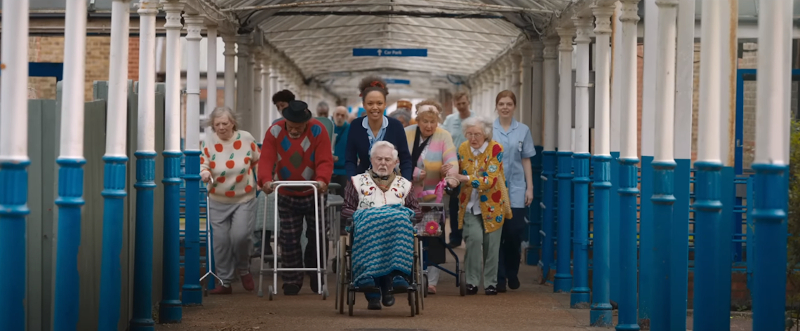
The more minor plots include a couple Mr. and Mrs. Earnshaw (Gerald Horan and Lorraine Ashbourne) whose confused and demented, former singer mother (Julia McKenzie) repeatedly protests, “it was my home”. The couple are primarily motivated by getting their hands on her house father than her well-being, an appalling state of affairs that I imagine is only too common in real life.
For the rest, the film serves up a collection of quirky characters among staff, patients, administrators, volunteers and even a film crew filming a segment on the hospital in the hope that that will be enough to make the film work as a film, but only rarely do these rise above being a mere sum of disparate parts. Everything, in fact, that I dislike about British cinema at its worst.
On a more positive note, Judi Dench is particularly good (but then, she always is) as Mary Moss, the patient who doesn’t really want to be involved with all the scenes of the patients being filmed as a happy group belting out songs who, as an alternative, is given an iPad and told to go about filming whatever she wants in the hospital. This is a dangerous thing to get someone to do and there are repercussions.
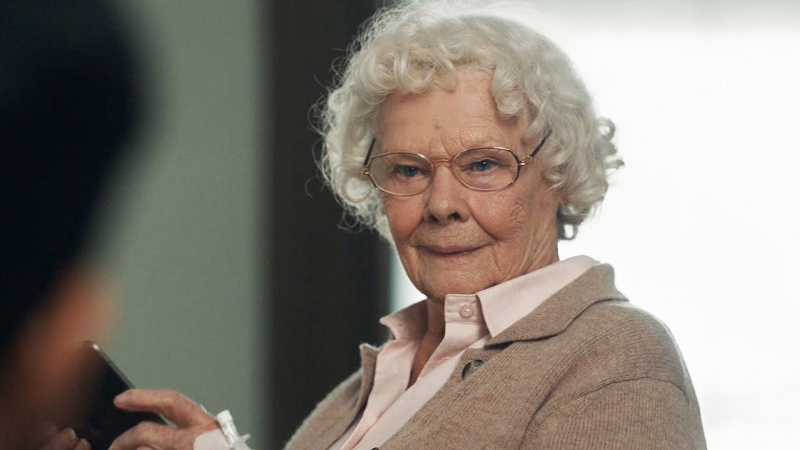
This element has so much potential it could have had another film built around it entirely, and seems to possess an altogether different tone from everything else going on. It might even have raised the film to the masterful cinematic level of the very different No Bears (Jafar Panahi, 2022) in which a camera-illiterate is given a recording device and sent out to shoot whatever they wish, with cataclysmic consequences.
The way this plot strand is eventually worked out in Allelujah, however, stretched my disbelief well beyond breaking point and isn’t really in keeping with everything else that went before. It boils down to a big reveal about Sister Gilpin which you’ll already know if you saw the play which I won’t give away here but merely note that the reveal occurs later in the film than it did on the stage. I’ve no idea if it worked in the play since I never saw it – perhaps it did – but it doesn’t work here.
We also get Derek Jacobi as former school teacher Ambrose who quotes from the poem Ten Types Of Hospital Visitor, Jesse Akele as the chirpy and enthusiastic Nurse Pinkney, and teenager Louis Ashbourne Serkis as Andy who is doing hospital work experience having applied late and not got the placement he wanted.
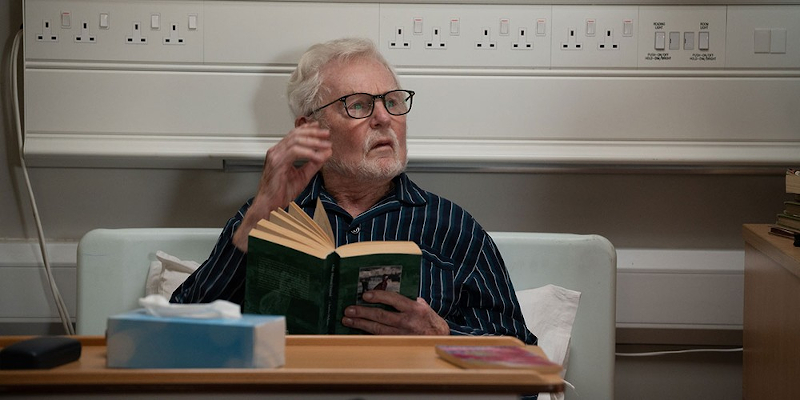
The last two scenes with Dr. Valentine are a misguided attempt to update the contemporary NHS situation to the present day (already overtaken and outdated by unprecedented RCN strike action). One shows him working tirelessly in a COVID ward where he runs into the bedridden Ambose, now a COVID patient. The trouble is, after documentaries like 76 Days (Weixi Chen, Hao Wu, anonymous, 2020) and The First Wave (Matthew Heineman, 2021) which took us right inside hospitals attempting to contain the virus in its early days (in China and the US respectively), the scene here looks cheap, stagey and unconvincing.
As if this weren’t bad enough, it’s followed by Dr. Valentine making a speech to camera about the importance of the NHS. Like many in the UK I’m extremely proud of the NHS, and believe we need to fight ideologically-driven government plans to turn it into a US-style, for-profit healthcare system, but this misconceived speech is an embarrassing turn-off.
None of the film’s problems are evident in the trailer, which presents everything that’s good about the film (and, if I’m honest, everything I wanted it to be) – a warts and all tale of the NHS, a hint of cost-cutting Tory government attitudes to it, the lives of resident patients and the dedication of those who care for them within it.
The title, in case anyone wonders, comes not (at least, not directly) from the fact that the preservation of the NHS is arguably the British national religion, but from one of the songs a specially assembled group of patents sing for the benefit of the visiting camera crew.
Allelujah is out in cinemas in the UK on Friday, March 17th.
Trailer:
